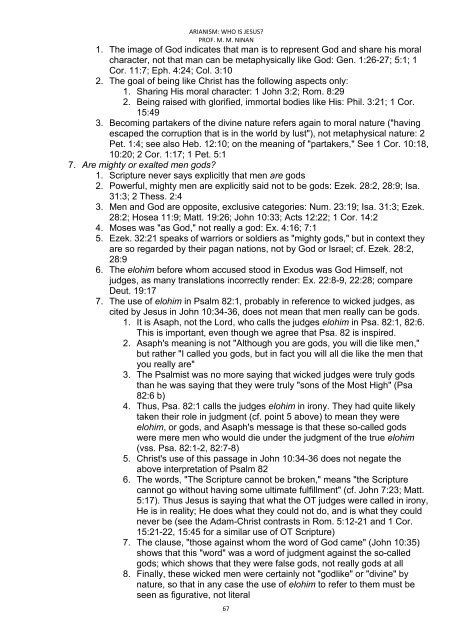Arius
You also want an ePaper? Increase the reach of your titles
YUMPU automatically turns print PDFs into web optimized ePapers that Google loves.
ARIANISM: WHO IS JESUS?<br />
PROF. M. M. NINAN<br />
1. The image of God indicates that man is to represent God and share his moral<br />
character, not that man can be metaphysically like God: Gen. 1:26-27; 5:1; 1<br />
Cor. 11:7; Eph. 4:24; Col. 3:10<br />
2. The goal of being like Christ has the following aspects only:<br />
1. Sharing His moral character: 1 John 3:2; Rom. 8:29<br />
2. Being raised with glorified, immortal bodies like His: Phil. 3:21; 1 Cor.<br />
15:49<br />
3. Becoming partakers of the divine nature refers again to moral nature ("having<br />
escaped the corruption that is in the world by lust"), not metaphysical nature: 2<br />
Pet. 1:4; see also Heb. 12:10; on the meaning of "partakers," See 1 Cor. 10:18,<br />
10:20; 2 Cor. 1:17; 1 Pet. 5:1<br />
7. Are mighty or exalted men gods?<br />
1. Scripture never says explicitly that men are gods<br />
2. Powerful, mighty men are explicitly said not to be gods: Ezek. 28:2, 28:9; Isa.<br />
31:3; 2 Thess. 2:4<br />
3. Men and God are opposite, exclusive categories: Num. 23:19; Isa. 31:3; Ezek.<br />
28:2; Hosea 11:9; Matt. 19:26; John 10:33; Acts 12:22; 1 Cor. 14:2<br />
4. Moses was "as God," not really a god: Ex. 4:16; 7:1<br />
5. Ezek. 32:21 speaks of warriors or soldiers as "mighty gods," but in context they<br />
are so regarded by their pagan nations, not by God or Israel; cf. Ezek. 28:2,<br />
28:9<br />
6. The elohim before whom accused stood in Exodus was God Himself, not<br />
judges, as many translations incorrectly render: Ex. 22:8-9, 22:28; compare<br />
Deut. 19:17<br />
7. The use of elohim in Psalm 82:1, probably in reference to wicked judges, as<br />
cited by Jesus in John 10:34-36, does not mean that men really can be gods.<br />
1. It is Asaph, not the Lord, who calls the judges elohim in Psa. 82:1, 82:6.<br />
This is important, even though we agree that Psa. 82 is inspired.<br />
2. Asaph's meaning is not "Although you are gods, you will die like men,"<br />
but rather "I called you gods, but in fact you will all die like the men that<br />
you really are"<br />
3. The Psalmist was no more saying that wicked judges were truly gods<br />
than he was saying that they were truly "sons of the Most High" (Psa<br />
82:6 b)<br />
4. Thus, Psa. 82:1 calls the judges elohim in irony. They had quite likely<br />
taken their role in judgment (cf. point 5 above) to mean they were<br />
elohim, or gods, and Asaph's message is that these so-called gods<br />
were mere men who would die under the judgment of the true elohim<br />
(vss. Psa. 82:1-2, 82:7-8)<br />
5. Christ's use of this passage in John 10:34-36 does not negate the<br />
above interpretation of Psalm 82<br />
6. The words, "The Scripture cannot be broken," means "the Scripture<br />
cannot go without having some ultimate fulfillment" (cf. John 7:23; Matt.<br />
5:17). Thus Jesus is saying that what the OT judges were called in irony,<br />
He is in reality; He does what they could not do, and is what they could<br />
never be (see the Adam-Christ contrasts in Rom. 5:12-21 and 1 Cor.<br />
15:21-22, 15:45 for a similar use of OT Scripture)<br />
7. The clause, "those against whom the word of God came" (John 10:35)<br />
shows that this "word" was a word of judgment against the so-called<br />
gods; which shows that they were false gods, not really gods at all<br />
8. Finally, these wicked men were certainly not "godlike" or "divine" by<br />
nature, so that in any case the use of elohim to refer to them must be<br />
seen as figurative, not literal<br />
67

















